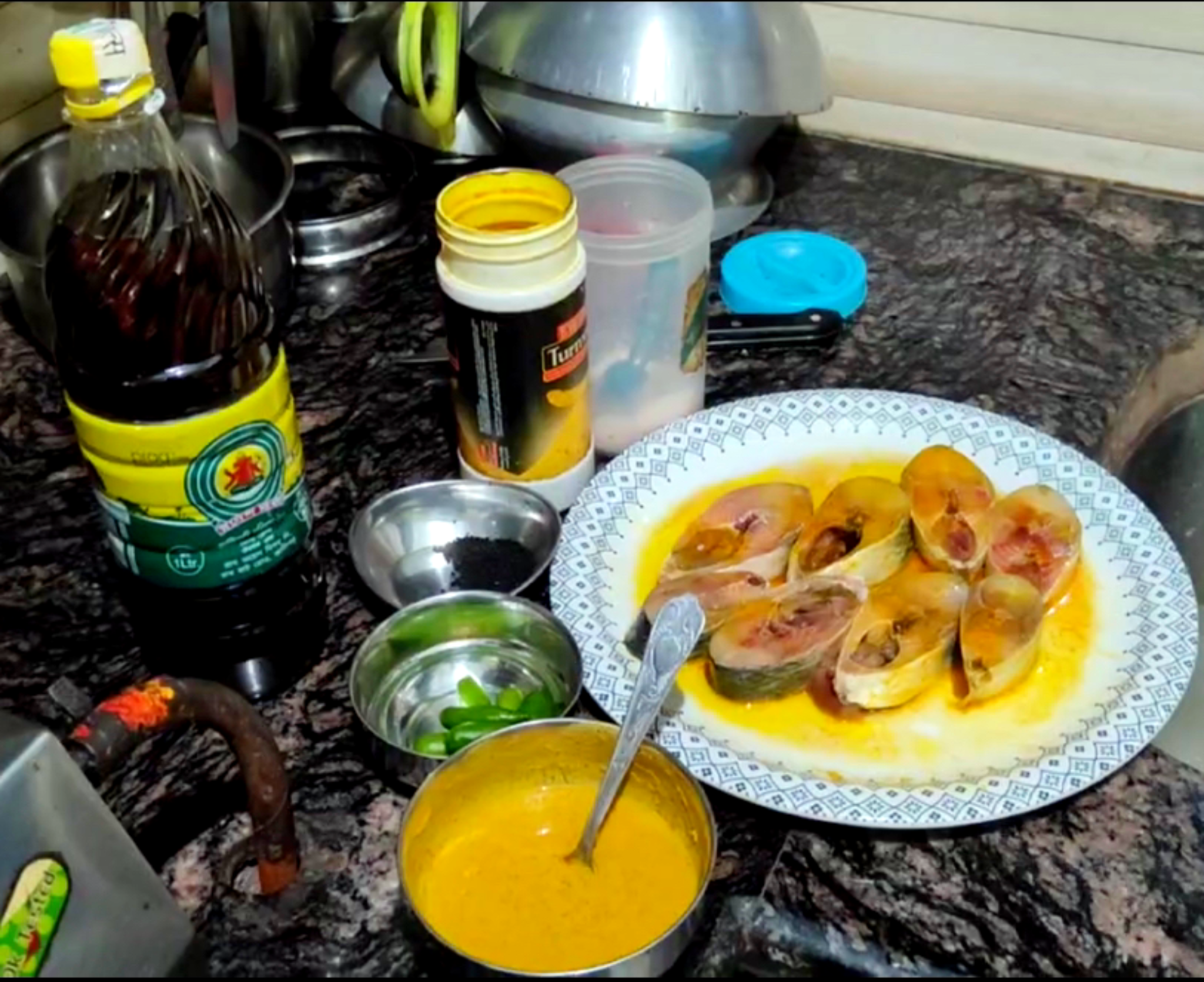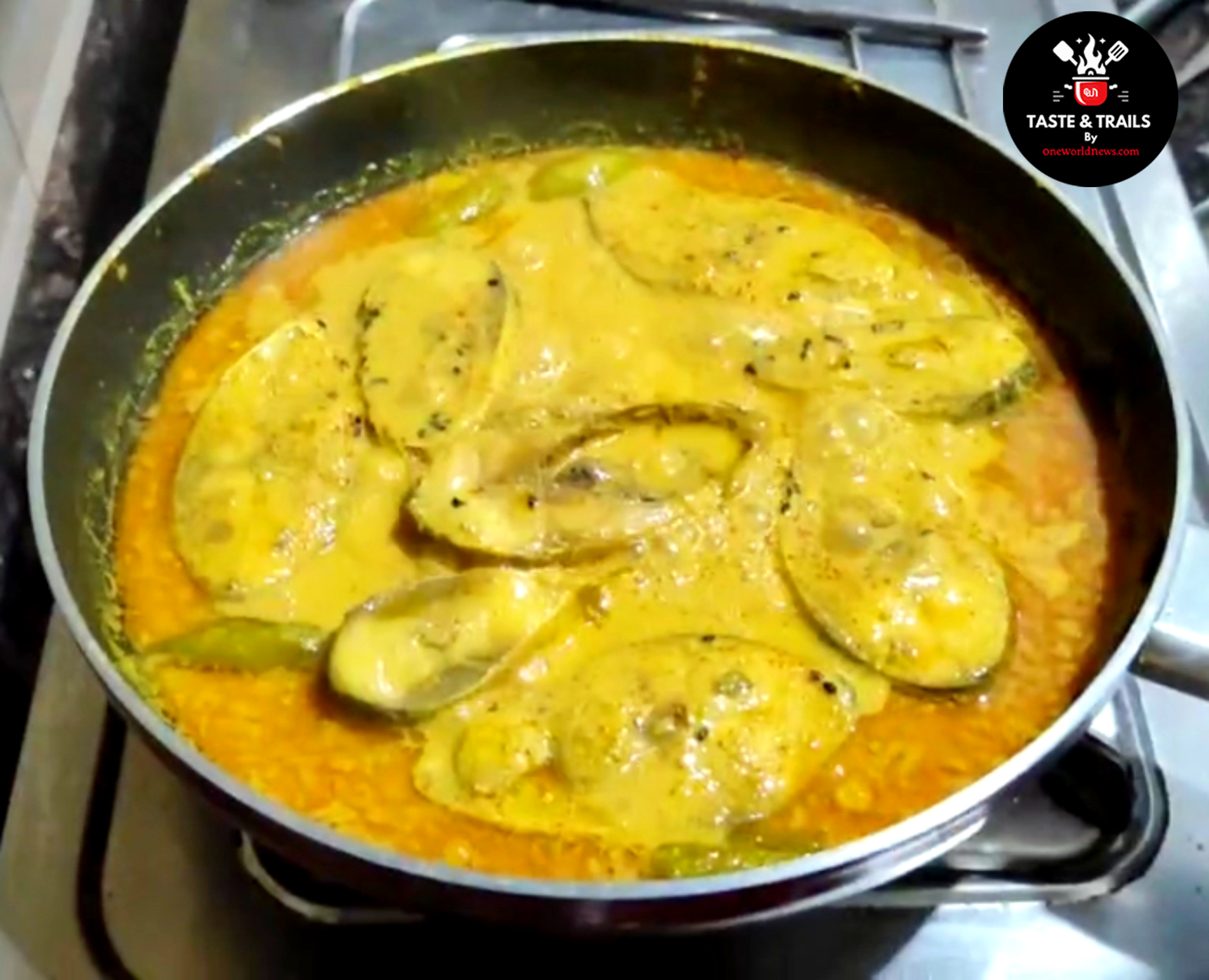A Bengali Culinary Delight: Rimi Didi’s Mustard Hilsa Fish Recipe
Discover the essence of Bengali cuisine with Rimi Didi's Hilsa fish recipe, featuring Ganesh mustard oil for a rich, authentic taste. A true culinary delight!
Unveiling Rimi Didi’s Secret: The Traditional Bengali Shorshore Ilish Maach Recipe with Ganesh Mustard Oil for an Authentic Culinary Experience
On a rainy afternoon, the tantalizing aroma of spices and fried fish wafted through the narrow lanes, guiding me to Rimi Didi’s home. As a food reporter always on the hunt for a compelling story, I knew I was about to embark on a flavorful adventure. Rimi Didi, a warm and vivacious Bengali youngster, was ready to share not just a recipe but a piece of her heart. Today, we would dive into the rich tradition of Bengali cuisine with a dish that has enchanted palates for generations: the legendary Hilsa fish in mustard oil, known locally as “Sarson-er Ilish Maach.”
Bengali Cuisine: A Love Affair with Flavors
Rimi Didi’s home was brimming with the excitement of preparing a cherished family recipe. With a warm smile, she introduced me to the star of the day: Hilsa fish, or Ilish, a prized ingredient in Bengali cuisine. “Our love for Hilsa fish is almost legendary,” she said, her eyes lighting up. For Bengalis, Hilsa is more than just a dish—it’s a culinary treasure.
She shared that today’s recipe was a family heirloom, passed down from her Jetima (grandmother), and she was eager to impart this time-honored recipe to me.

The Secret Ingredient: Ganesh Marka Mustard Oil
As Rimi Didi prepared to cook, she revealed a fascinating detail about her kitchen. “Ganesh Marka Mustard Oil is our kitchen’s secret weapon,” she said with evident pride. “Its rich aroma, exquisite flavor, and top-notch quality make it our first choice. We’ve been using it for as long as I can remember.”
Ganesh Marka Mustard Oil, with its robust mustard flavor, is not just an ingredient but an essential component of Bengali cooking. It imparts a depth of flavor and a distinct aroma that elevate every dish.
Gathering the Ingredients
Before diving into the cooking process, we assembled the key ingredients:
- Hilsa Fish: 500 grams, glistening and fresh
- Kala Jeera (Nigella Seeds): ½ teaspoon, adding a hint of complexity
- Green Chilies: 5-7, vibrant and spicy
- Ganesh Marka Mustard Oil: As needed, for a rich, savory depth
- Spices: Turmeric powder, red chili powder, and mustard powder
With everything in place, Rimi Didi’s kitchen was transformed into a vibrant hub of culinary creativity.

Crafting the Perfect Hilsa Fish
- Preparing the Fish: Rimi Didi meticulously washed the Hilsa fish three times, ensuring it was impeccably clean. “Cleanliness is essential,” she emphasized. She then marinated the fish with turmeric, salt, and Ganesh Marka Mustard Oil, letting it sit for 10 minutes. “This marination process ensures the fish absorbs all the rich flavors,” she explained.
- Frying the Fish: We heated a pan, but Rimi Didi avoided adding extra oil. “The fish has been marinated with Ganesh Marka Mustard Oil, so no additional oil is needed,” she noted. She carefully placed the fish in the pan, cooking it until it turned a perfect golden brown and crispy. This method mellows the strong flavors of the Hilsa, making it more approachable and delicious.
Creating the Mustard Oil Gravy
- Building the Flavorful Base: After removing the fish, Rimi Didi began preparing the mustard gravy. She added a bit more Ganesh Marka Mustard Oil to the pan, using the oil left from frying the fish. “This technique ensures that the rich flavors from the fish are absorbed into the oil,” she said.
- Frying the Spices: She introduced kal jeera and green chilies to the hot oil, creating a fragrant, mouthwatering base. Following this, she added a spice mix made from turmeric, red chili, and mustard powders. “These spices are the heart of Bengali flavor,” she explained.
Bringing It All Together
- Simmering the Gravy: Rimi Didi poured some hot water into the pan with the spices, allowing it to simmer gently. “Properly cooking the spices is crucial for developing the full flavor,” she said. Once the gravy had thickened to the right consistency, she added the crispy fried fish back into the pan. “We let the fish simmer in the gravy for about 10 minutes, allowing the flavors to meld perfectly.”
- Finishing Touches: As the dish neared completion, Rimi Didi drizzled a final touch of Ganesh Marka Mustard Oil over the top. “This final drizzle enhances the dish’s richness and aroma,” she said.
A Taste of Tradition
When the Sarson-er Ilish Maach was served, the dish was a feast for the senses. The mustard-yellow gravy was rich and inviting, and the crispy fish glistened with an enticing sheen. As I took my first bite, the flavors were a harmonious blend of spice and tenderness.
Rimi Didi’s recipe was more than just a culinary demonstration; it was a deep dive into Bengali culture and tradition. Her use of Ganesh Marka Mustard Oil was not just a choice of ingredient but a reflection of her family’s culinary heritage. This recipe serves 3-4 people, making it a perfect dish for a family meal or a small gathering.
A Culinary Legacy
In Bengali culture, cooking is an art form steeped in emotional and cultural significance. Rimi Didi’s Hilsa fish recipe is a testament to this tradition. The role of Ganesh Marka Mustard Oil in her kitchen underscores the deep connection between food and family legacy.
As I left Rimi Didi’s home, I carried with me a newfound appreciation for Bengali cuisine and the stories woven into each dish. Rimi Didi’s Sarson-er Ilish Maach is not merely a recipe; it’s a celebration of Bengali culinary heritage and the joy of sharing a meal with loved ones.
We’re now on WhatsApp. Click to join
Like this postRegister at One World News to never miss out on videos, celeb interviews, and best reads.








